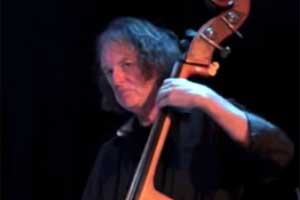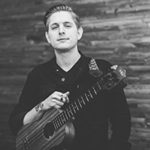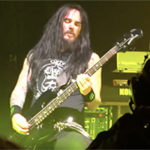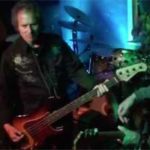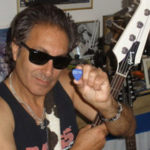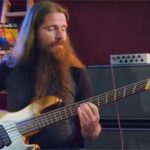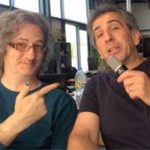Bass legend talks to FBPO about his new star-studded Woody Guthrie tribute album, “Note of Hope” in this very special interview!
Exclusive interview with FBPO’s Jon Liebman
May 28, 2012
Perhaps best known for his trilogy of recording projects, aptly titled Solo, Duets and Trios, Rob Wasserman has also played bass, in somewhat lengthy stints, with Lou Reed, Rickie Lee Jones, Dave Grisman and the Grateful Dead’s Bob Weir. Rob’s recordings have included collaborations with a diverse list of music icons, including Bobby McFerrin, Stéphane Grappelli, Jerry Garcia, Carnie Wilson, Willie Dixon and Branford Marsalis. He has also performed with Dan Hicks, Maria Muldaur, Van Morrison, Oingo Boingo, Gov’t Mule and Elvis Costello.
Wasserman’s latest release, Note of Hope, is a tribute to American songwriting legend Woody Guthrie. The collection features stunning bassmanship from Wasserman, in collaborations with Jackson Browne, Ani DiFranco, Kurt Elling, Michael Franti, Nellie McKay, Tom Morello, Van Dyke Parks, Madeleine Payroux, Lou Reed, Pete Seeger, Studs Terkel, Tony Trischka, and Chris Whitley. Note of Hope was released by 429 Records in September 2011.
FBPO: It must feel like quite an honor to have been approached by Nora Guthrie, Woody’s daughter, to spearhead the new tribute album, Note of Hope.
RW: I was performing a solo bass tribute to Robert Johnson at the Rock & Roll Hall of Fame a while back. Nora came up to me afterwards and asked if I’d like to create new music for her father’s words from his unpublished journals and notebooks from the 1940s and ’50s. I immediately said yes! It has been a great honor.
FBPO: The Woody Guthrie catalog includes some 3,000 songs. How did you go about picking which ones to include on Note of Hope?
RW: Nora chose words that she thought would be appropriate for the individual artists from those journals. We’d offer two or three pieces each to chose from. Everyone loved what she offered! She also let artists edit the words if they wanted. Lou added his own words to Woody’s. Jackson did a little editing, reducing his piece from thirty pages to around twenty pages, which turned into a fifteen-minute song. These were not lyrics to begin with, but stories from Woody’s journals, which made it very challenging to create songs.
FBPO: How about the collaborations? Your choices for Duets and Trios were spot on. How did you decide who should be on Note of Hope?
RW: I suggested some of the artists. Several were already friends, such as Lou, Michael, Ani, Chris, Jackson and Van Dyke. The other producers, Nora, Clare, Steve and Jeff, suggested and invited artists. Everyone weighed in.
FBPO: That’s quite a diverse lineup. While each one is a star in his or her own right, I’m especially intrigued by Pete Seeger, a close friend of Woody’s, who still sounds as youthful as ever on your new recording. Tell me about him. What was it like to work with a legend of his stature?
RW: Pete is a true American legend. I’ve been a fan of his since I was a teenager. We went to his place in upstate New York and hung out for a day. We could barely keep up with Pete running up and down his mountain property and then chopping firewood! He and I jammed all day in his living room, with Pete reciting Woody’s words. He told stories about his time with Woody. It was a lot of fun.
FBPO: Was Arlo Guthrie involved in any part of the production? His name seems conspicuously absent.
RW: Arlo wasn’t involved. I think Nora wanted to do something really different with this project. I’ve met Arlo and really like him and his work.
FBPO: You must have learned a lot about Woody Guthrie, both the man and his music, while working on this project. What insights can you share that you unaware of prior to making Note of Hope?
RW: He wrote about the concerns of everyone. He wrote in a very contemporary way. He was way ahead of his time as a writer. He saw the future in the present. He seemed fearless. He did what he wanted and wrote about it all the time. When I was a teenager, I read his book. It inspired me to live in the moment. This project made me respect him even more. His words came to life with our new music. He drew wonderful pictures on most of his notebooks we used. They were fun and helped to inspire us. I learned that Woody had more to say and more compassion about everything concerning his fellow man than anyone I’ve ever read or known.
FBPO: By the way, there’s some truly great bass playing on this album!
RW: Thanks! Nora wanted this to be a bass/voice album with words, at its core. I think its essence is bass and words.
FBPO: Your background is so diverse and you’ve accomplished so much in your career. What else would you like to do? Maybe a Quartets album – or is that too obvious?
RW: I’d like to create an album of interstellar bass jams on Mars. I just did some playing with the great Richard Davis in Madison. Next to Mingus, he’s my favorite. My passion is composing music for film. Mars can wait…
FBPO: What would you be if you weren’t a bass player?
RW: I wouldn’t know. Music is my life. Maybe a writer. I love mysteries.
